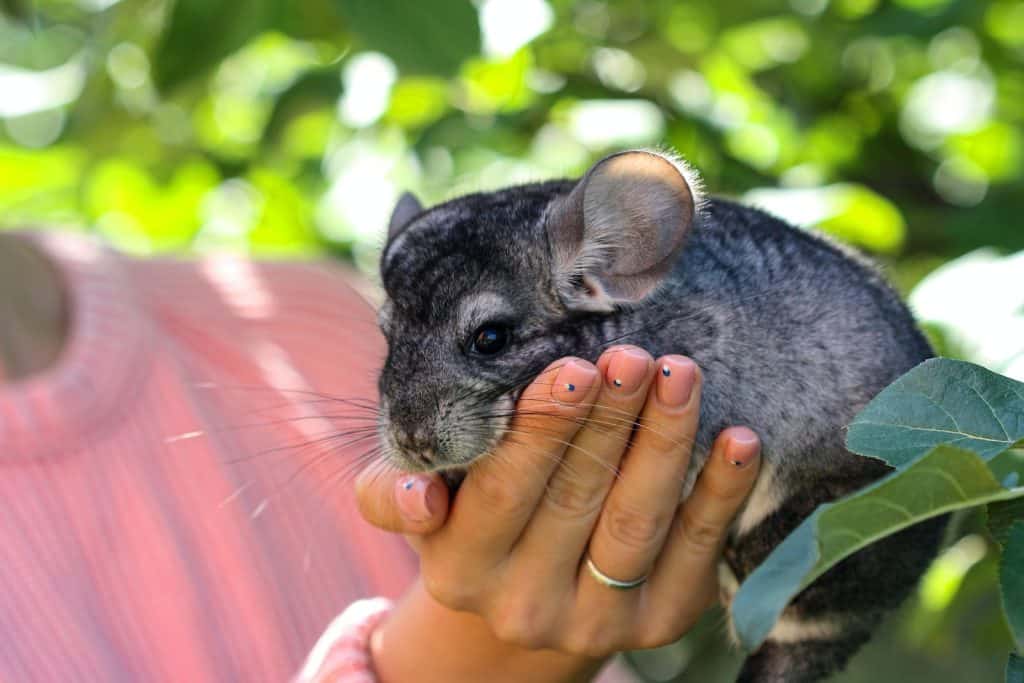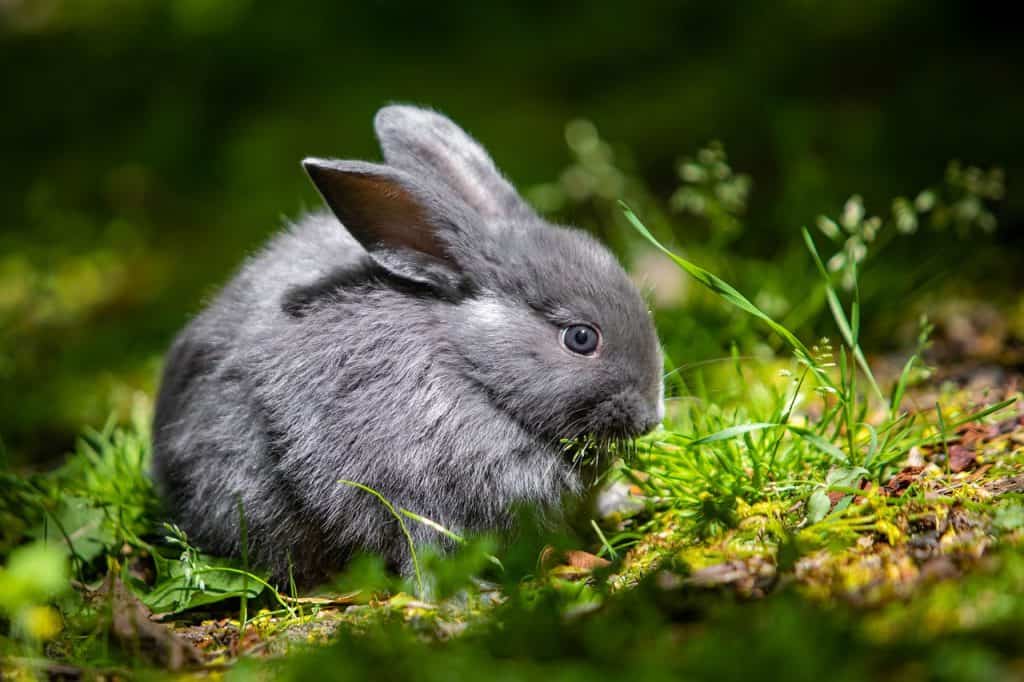
| Size: | Giant |
| Weight: | Maximum 16 Pounds |
| Lifespan: | 5-8 Years |
| Type of body: | Semi-arch |
| Temperament: | Gentle, docile, passive |
| The Best for: | Families with older children, first-time owners of rabbits, indoor/outdoor. |
| Similar Breeds | Flemish Giant. American Chinchilla Standard Chinchilla Checkered Giant |
These gentle giants are one of three Chinchilla breeds that the American Rabbit Breeders Association recognizes as the largest. The Giant Chinchilla was a descendant of the smaller Chinchilla from France. But, we’ll let you decide.
The Giant Chinchilla is a popular house pet because of its unique, densely colored coat and almost dopey demeanor. We’ll explore their history, and origins, and offer helpful tips on caring for them at home.
If you are considering keeping one of the rabbit breeds mentioned above, or are just curious about their origins and how they behave, read on!
The Giant Chinchilla Rabbit Breed: History and Origin
Edward Stahl, a Kansas City, Missouri breeder, imported two Chinchillas shortly after they were developed in France. He began his quest to improve this new breed from a curious beginning in 1919.
Stahl’s first great success was achieved in just two years. He crossed a Chinchilla and white Flemish Giants, New Zealand, and an American Blue to produce what he considered a perfect example of his new breed.
His “Million Dollar Princess” bunny, then called the American Giant Chinchilla was a huge success at the 1922 Kansas City Rabbit Show. The Giant Chinchilla was a rare combination of desirable qualities in a meat and fur rabbit. It quickly became a national favorite.
Although rabbit breeding was not a popular hobby or business venture after World War II, Giant Chinchillas survived as a breed due to the dedication of dedicated enthusiasts.
General Description
A Giant Chinchilla’s distinctive fur color is the first thing you will notice. This coat is similar to the smaller Chin family members that are named after them. It has a mix of black, gray, silver, and tan.
It’s hard to overlook the size of the Giant Chinchilla. Their strong, semi-arched bodies can weigh almost 16 pounds. This makes them another heavyweight domestic rabbit.

Nutrition and Health
Giant Chinchillas, because of their large size, are more susceptible to health issues if they don’t get proper exercise and a healthy diet. These guidelines will help you prevent this:
You’d be amazed at how much water they can drink and how much-filtered water you provide. To increase their vitamin and mineral intake, supplement this daily with dark, leafy greens or nutrient-dense rabbit food.
Giant rabbit breeds need to have a large enclosure. They should be able and able to move freely, reach their full height, and stretch easily. Giant Chinchillas thrive in an indoor/outdoor environment. It is important for their health to exercise every day. Encourage them to walk around the house at least once a day.
Grooming
All Chinchilla breeds require more attention than other rabbits. However, the Giant Chin needs the most care because of its thick and luxurious coat. They have a large amount of fur to care for, so they are more susceptible to digestive problems.
Temperament
Giant Chinchillas can be one of the gentlest rabbits you will find. They can be relaxed and even border on lazy, so make sure they have plenty of toys! They are at their best when they have plenty of stimulation. However, it is not recommended to mix them with children under five years old. Both could be hurt by an accident.
Last Thoughts on Giant Chinchilla Rabbit Breed
The Giant Chinchilla is an Americanized version of a classic French breed. It was originally intended to be a meat- and fur-eating dog. However, it has gained a reputation for being a great house pet and a loyal companion.
We hope that you enjoyed this little giant of the rabbit world.
How large can Giant Chinchilla rabbits grow?
Giant Chinchillas are huge, with mature bucks measuring 12 to 15 pounds and females weighing 13 to 16 pounds.
Chinchilla rabbits are friendly?
Chinchilla rabbits are often docile, kind, and gentle. They appreciate people and attention and are clever, curious, and active rabbits. Chinchillas are often nice with children and make excellent house rabbits.
Who is the wisest Bunny?
According to Mother Nature Network, the Belgian Hare is the brightest domesticated rabbit. The Harlequin Rabbit is also regarded as one of the most clever lagomorphs.
Chinchillas may bite?
In the absence of an escape route, the chinchilla may bite the threat (typically the owner’s fingers). This form of biting is most likely when the pet owner reaches in unexpectedly to catch the chinchilla. Chinchillas have long, razor-sharp front teeth. A violent, deep, and painful bite can occur.
What foods can I give my Chinchilla rabbit?
Your chinchilla’s food should consist of at least 75-80% grass hay, with the rest, made up of pellets, vegetables, and the odd treat. Here are some tasty snacks for your chinchilla: Pears. Apples that are green, apricots, raisins (no more than 3 or 4 a week), blueberries, grapes, cheerios, and simply shredded wheat.
What size cage is required for a Chinchilla rabbit?
The greater the size of the cage, the better. A tall cage with shelves and ladders that allow the chinchilla to climb is ideal; if feasible, obtain a tall cage with shelves and ladders that allow the chinchilla to climb. Avoid using plastic cages or accessories since chinchillas may easily eat and damage the plastic.
How difficult is it to look after a chinchilla?
Because they have certain unique needs, they are often classified as intermediate in terms of difficulty as a pet. Chinchillas require a suitable-sized environment with bedding, plenty of hay, chewable things, weekly dust baths, and other amenities.
Is it possible to toilet train a chinchilla?
Chinchillas are one of the most intelligent rodent species, and many of them have been toilet-trained by their owners. Most litter-box-trained chinchillas continue to defecate about the cage, but they may be taught to urinate in the litter box.
Do chinchillas have a strong odor?
Chinchillas, unlike many other home pets, have virtually no odor. If your chinchilla stinks, he’s either sick or you’re not cleaning his cage as frequently as you should. If your pet’s body begins to stink, take him to the veterinarian as soon as possible for a diagnosis and treatment.
What is the cost of a Giant Chinchilla rabbit?
A Giant Chinchilla’s typical selling price ranges from $40 to $100 or more. You must consider the expense of care, which includes: a bigger rabbit hutch or cage ($75 and up for a cage, $130 and more for a hutch)